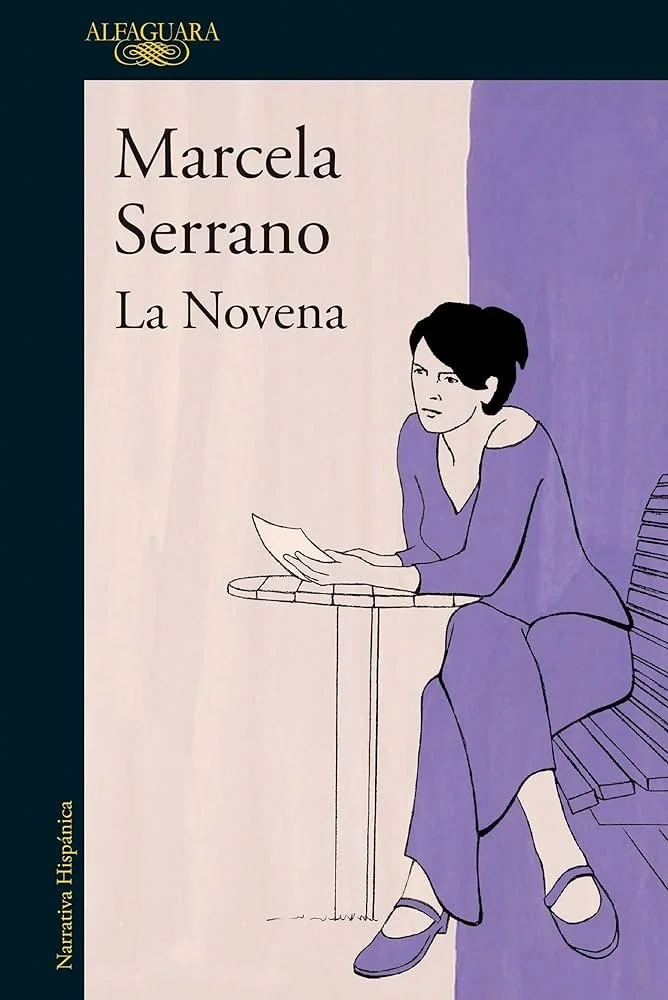On the Verge of Venom: Literature as Forgiveness in Latin America
La Novena. Marcela Serrano. 2016. Amazon.
In the end of her startling testimony The Inferno: A Story of Terror and Survival in Chile, Luz Arce converses with the Truth and Reconciliation Commission lawyer Carlos Fresno about the possibility of forgiving her past government captors. Years after absorbing torture, and ultimately collaborating with, Chile’s secret police (DINA), Arce certainly found herself in a unique position to (not) forgive as well as request a pardon herself. Although spared death due to her work for DINA and Augusto Pinochet’s dictatorship, Arce’s psychological trauma continued to fester decades later; the “Convivencia” encouraged under Patricio Aylwin’s presidency (1990-1994), after all, privileged an uneasy coexistence without judicial consequences for the great majority of human rights violators. For Arce, this discussion with Fresno illuminates the numerous steps needed to reach a measure of personal forgiveness following these unpunished crimes: “Carlos Fresno is someone who knows that to really ask for forgiveness you have to go through the process of accepting what happened and then take responsibility for it individually and collectively” (Arce 331). Both victim and traitor, Arce represents a liminal figure far after the conclusion of Latin America’s dictatorships of the 1970’s and 80’s. From a continental perspective, this exploration of a much needed personal and national pardon remains an urgent topic. In the case of Chile, Marcela Serrano’s La Novena (2016) stands as a particularly poignant example of the power of literature to stimulate a collective national reckoning in terms of navigating the border of hatred and forgiveness.
When an anticipated future of a productive and cooperative citizenry teeters between outraged bitterness and possible forgiveness, the latter option offers the only viable avenue. That is, as Martha Nussbaum argues, forgiving follows from an effort to relate to others’ feelings in a manner otherwise foreclosed by rage. In the end, anger is “a large impediment to the generosity and empathy that help to construct a future of justice” (Nussbaum 8). Thus, a swift vengeance against Pinochet’s seventeen-year dictatorship would defeat Chile’s much-awaited democratic return and permanence; any hope of accountability for past crimes would promptly disappear without a collective forgiveness. Moreover, narrative is uniquely situated to address a nefarious past that forgiveness alone lacks the power to transform (Griswold 100). Although the process of forgiving allows for the chance to adjust past wrongs, novels count themselves among especially effective choices for modifying the past discursively.
From a literary point of view, Mikhail Bakhtin famously applies this spatial temporal intersection to literature in the figure of the chronotope. In particular, he visualizes this theoretical combination in terms of the encounter motif (97); meetings, then, encapsulate both time and space revealing a rich crossroads between characters. In the case of La Novena, this concept of the chronotope forges particularly powerful links to the ledge dividing forgiveness and resentment in postdictatorship Chile. An isolated country home kept by a well-known and respected woman named Amelia, la Novena becomes a refuge for the young subversive Miguel Flores who is legally relegated to the area for his political activities in 1985. Nevertheless, despite “Santa Amelia’s” acceptance of Miguel into her home when the latter finds only cold indifference in the town, Miguel ultimately betrays her by hiding weapons on her property and escaping during the arrival of the authorities. In addition, the police’s subsequent discovery and fruitless torture of Amelia create an inherited anger in her exiled sister Sybil as well as her daughter Mel. Ultimately, it is only this unified time and place symbolized by the name of la Novena that will glimpse a possible forgiveness and (re)productive Chilean future.
A true pardon requires two willing partners, and the tense situation following Amelia’s detention and torture reveals Miguel and Mel as the initially opposing entities in La Novena. After receiving a scholarship to study in England, Miguel’s willful ignorance of Amelia’s suffering remains unaffected for years abroad. Miguel’s guilt eventually overwhelms him, however, and he locates Sybil with the hopes of eventually earning forgiveness in a distinctly spatial manner: “Quiero ir hacia el perdón, Sybil, ese lugar iluminado que no conozco ni merezco […] Pero algún día voy a estar en ese lugar utópico” (Serrano 194-5). No longer an agreed-upon concept, but rather, forgiveness becomes a destination for Miguel. Moreover, his visualization of a path followed to reach this no-place (“utopía”) suggests a reunion for which Miguel yearns upon meriting Amelia’s family’s forgiveness.
Although Sybil reluctantly offers her own personal pardon to Miguel, her message to Mel written before Sybil’s untimely death underscores that the aunt feels unqualified to bestow this gift of forgiveness. Still, operating as an intermediary between Miguel and the target of his quest for forgiveness, Sybil does succeed in opening the door to Miguel’s atonement. This achievement only occurs, however, when location and time weave together in the form of la novena. To commemorate (as well as digest) the passing of her aunt, Mel explains to a visiting Miguel that she honored Sybil with an appropriately temporal celebration: “Aunque no encargué nada a una cofradía, hice mi novena por su muerte, nueve noches llorándola y hablando con ella desde su propio hogar, era una forma de oración” (Serrano 238). Mourning Sybil from Chile, Mel employed a timed Catholic remembrance “bringing her home,” for nine days at least. Corresponding with the name of the familial property, la novena-as-ceremony also allows for a site-specific memorial dedicated to the original catalyst for this once impossible forgiveness. In a melodramatic twist, Mel overcomes her own resentment with Miguel to the point that she sleeps with him and subsequently gives birth to a baby, Sybil. As a symbol of forgiveness, this child highlights the hope for national reconciliation by carrying a name that began the process of pardon on the verge of permanent hatred and estrangement.
While publishing houses of Latin American fiction increasingly favor authors and topics that sell both in Spanish and translation (a distinction enjoyed by a number of Serrano’s books), the Chilean experience of diaspora after September 11, 1973 demands an international distribution in and of itself. To readily reach this dispersed Chilean public and engage its readers in the urgency of forgiveness, whether intimated by Luz Arce’s testimonio or requested by Miguel Flores, Serrano’s novel, for one, volunteers a recognizable knot of Chilean commemoration time and place to welcome a pardon and the chance of a hopeful future. The birth of Sybil as a personification of the process of forgiveness owes much to women’s bodily adaptability, as mentioned by Serrano in an interview: “Creo que las mujeres (y esto no es ningún chauvinismo) tienen más capacidad de empezar de nuevo que los hombres. Esto puede ser debido a un factor físico: nosotras somos más cíclicas, tenemos la capacidad de cambiar de piel –por decirlo así– y de rearmarnos” (García-Corrales 230). In post-Transition Chile, this pragmatic capacity to embrace the long road of forgiveness permits Mel to transform herself and her destiny in a decidedly corporeal manner. Whether or not Chileans choose to return to their own personal novena, Serrano’s novel presents a literary time and place that unites their most generous inclinations for a shared future.
About the Author
I am a Professor of Spanish at the University of Wisconsin-Platteville. I earned my MA at the University of Colorado-Boulder and Ph.D. at the University of Wisconsin-Madison. In 2022, I received the Alliant Energy Underkofler Excellence in Teaching Award from the University of Wisconsin System. My classes taught include Colonial and Modern Latin American literatures and cultures, Teaching World Languages Methods, Crime and Punishment in twentieth and twenty-first century Latin American literature, and Latin American Women Writers. I have published articles in "Letras femeninas", "Hispania", and "Revista de estudios hispánicos", among others.
Works Cited
Arce, Luz. The Inferno: A Story of Terror and Survival in Chile. Translated by Stacey Alba Skar. U of Wisconsin P, 2004.
Bakhtin, Mikhail M. The Dialogic Imagination. Translated by Caryl Emerson and Michael Holquist. Ed. Michael Holquist. U of Texas P, 1982.
García-Corrales, Guillermo. “Nostalgia versus modernidad: Entrevista a Marcela Serrano.” Confluencia, vol. 13, no. 1, 1997, pp. 228-34.
Griswold, Charles L. Forgiveness: A Philosophical Exploration. Cambridge UP, 2007.
Nussbaum, Martha C. Anger and Forgiveness: Resentment, Generosity, Justice. Oxford UP, 2019.
Serrano, Marcela. La Novena. Santiago: Alfaguara, 2016.

